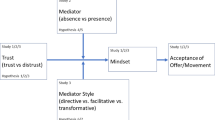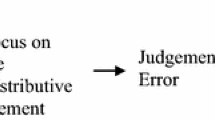Abstract
This research examined how trust affected resource allocation in a three-party negotiation. Negotiators were presented with an empty core problem in which their theoretical share of resources exceeded the resources available for distribution. We tested which of three components of trust—reliability, predictability and empathy—predicted negotiators’ outcomes. We distinguished between absolute and relative trust. We found that relative trust was a more consistent predictor of individual outcomes than absolute trust and that the most trusted party in a network obtained the highest individual outcomes. This finding highlights the importance of social context in shaping trust judgements. The component of trust that predicted individuals’ outcomes was affected by structural power. High and low power negotiators benefited from conveying empathy (identity-based trust), whereas moderate power negotiators benefited from conveying predictability (knowledge-based trust). Low power parties also benefited from appearing unreliable (low calculus-based trust).
Similar content being viewed by others
References
Anderson C, Berdahl J (2002). The experience of power: examining the effects of power on approach and inhibition tendencies. J Personality Soc Psychol 83: 1362–1377
Ancona D, Friedman R, Kolb D (1991). The group and what happens on the way to “yes”. Negotiation J 7: 155–174
Bhattacharya R, Devinney TM, Pillutla MM (1998). A formal model of trust based on outcomes. Acad Manage Rev 23: 459–472
Boon SD, Holmes JG (1991). The dynamics of interpersonal trust, resolving uncertainty in the face of risk. In: Hinde, RA, Groebel, J (eds) Cooperation and prosocial behavior, pp. Cambridge University Press, Cambridge
Bradach JL, Eccles RG (1989). Price, authority and trust: from ideal types to plural forms. Annu Rev Sociol 15: 97–118
De Dreu C, Van Kleef G (2003). The influence of power, on the information search, impression formation and demands in negotiation. J Exp Soc Psychol 40: 303–319
De Dreu C, Giebels E, Van de Vliert E (1998). Social motives and trust in negotiation: the disruptive effects of punitive capability. J Appl Psychol 83: 408–422
Deutsch M (1982). Interdependence and psychological orientation. In: Derlega, VJ, Grzelak, J (eds) Cooperation and helping behavior: theories and research, pp. Academic Press, New York
Fiske ST (1993). Social cognition and social perception. Annu Rev Soc Psychol 44: 155–194
Giebels E, De Dreu C, Van de Vliert E (1998). Social motives and trust in negotiation: the disruptive effects of punitive capability. J Appl Psychol 83: 408–422
Giebels E, De Dreu C, Van de Vliert E (2000). Interdependence in negotiation: effects of exit options and social motive on distributive and integrative negotiations. Eur J Soc Psychol 30: 255–272
Goodwin SA, Operario D, Fiske ST (1998). Situational power and interpersonal dominance facilitate bias and inequality. J Soc Issues 54: 677–698
Jones G, George J (1998). The experience and evolution of trust: implications for cooperation and teamwork. Acad Manage Rev 23: 531–546
Kabanoff B (1991). Equity, equality, power and conflict. Acad Manage Rev 16: 416–441
Keltner D, Gruenfeld D, Anderson C (2003). Power, approach and inhibition. Psychol Rev 110: 265–284
Kim P, Ferrin D, Cooper C, Dirks K (2004). Removing the Shadow of Suspicion: the effects of apology versus denial for repairing competence-versus integrity-based trust violations. J Appl Psychol 89: 104–118
Kim P, Pinkley R, Fragale A (2005). Power dynamics in negotiation. Acad Manage Rev 30: 799–822
Lax D, Sebenius J (1986). The manager as negotiator. Free Press, New York
Lewicki RJ, Bunker B (1996). Developing and maintaining trust in work relationships. In: Kramer, RM and Tyler, TR (eds) Trust in organizations: frontiers of theory and research, pp. Sage Publications, Thousand Oaks
Lewicki RJ, Stevenson MA, Bunker BB (1997) The three components on interpersonal trust: instrument development and differences across relationships. Paper presented at the Academy of Management Meeting
Lewicki RJ, Saunders DM, Minton JW (1999) Negotiation, 3rd ed. , McGraw-Hill International Edition
McAllister DJ (1997) The second face of trust: reflections on the dark side of interpersonal trust in organizations. Res Negotiation Organizations 6:87–112
McKelvey RD, Ordeshook PC (1980). Vote trading: an experimental study. Public Choice 35: 151–184
McKnight DH, Cummings LL, Chervany NL (1998). Initial trust formation in new organizational relationships. Acad Manage Rev 23: 473–490
Mannix EA (1993). The influence of power, distribution norms and task meeting structure on resource allocation in small group negotiation. Int J Conflict Manage 4: 5–23
Mannix EA (1994). Will we meet again? Effects of power, distribution norms and scope of future interaction in small group negotiation. Int J Conflict Manage 5: 343–368
Meyerson D, Weick KE, Kramer RM (1996). Swift trust and temporary groups. In: Kramer, RM, Tyler, TR (eds) Trust in organizations: frontiers of theory and researchfs, pp 166–195. Sage Publications Inc., Thousand Oaks, CA, US,
Molm LD, Takhashi N, Peterson G (2000). Risk and trust in social exchange: an experimental test of a classical proposition. Am J Sociol 105: 1396–1427
Murnighan JK (1978). Models of coalition behavior: game theoretic, social psychological and political perspectives. Psychol Bull 85: 1130–1153
Polzer JT, Mannix EA, Neale MA (1998). Interest alignment and coalitions in multiparty negotiations. Acad Manage J 41: 42–54
Pruitt DG, Kimmel MJ (1977). Twenty years of experimental gaming: critique, synthesis and suggestions for the future. Annu Rev Psychol 28: 363–392
Raiffa H (1982). The art and science of negotiation. Belknap, Cambridge, MA
Rubin JZ, Brown B (1975). The Social Psychology of Bargaining and Negotiation. Academic Press, NY
Rubin JZ, Zartman IW (1995). Asymmetrical negotiations: some survey results that may surprise. Negotiation J 14: 349–364
Rubin JR, Zartman IW (2000). Power and negotiation. University of Michigan Press, Ann Arbor
Shapiro D, Sheppard B, Cheraskin L (1992). Business on a handshake. Negotiation J 8: 365–377
Sheppard B, Sherman D (1998). The grammars of trust: a model and general implications. Acad Manage Rev 23: 422–438
Thompson L (2000) The mind and heart of the negotiator, 2nd edn. Prentice Hall.
Tsai W, Ghoshal S (1998). Social capital and value creation: the role of intrafirm networks. Acad Manage J 41: 464–476
Van Lange PAM, Semins-Gossens A (1998). The boundaries of reciprocal cooperation. Eur J Soc Psychol 28: 847–854
Whitener EM, Brodt SE, Korsgaard MA, Werner JM (1998). Managers as initiators of trust: an exchange relationship framework for understanding managerial trustworthy behavior. Acad Manage Rev 23: 513–530
Author information
Authors and Affiliations
Corresponding author
Additional information
The research reported in this paper was supported by a grant from the Australian Research Council. An earlier version of this paper was presented at the 2002 International Association of Conflict Management Conference, Park City, Utah.
Rights and permissions
About this article
Cite this article
Olekalns, M., Lau, F. & Smith, P.L. Resolving the empty core: trust as a determinant of outcomes in three-party negotiations. Group Decis Negot 16, 527–538 (2007). https://doi.org/10.1007/s10726-007-9084-8
Received:
Accepted:
Published:
Issue Date:
DOI: https://doi.org/10.1007/s10726-007-9084-8




